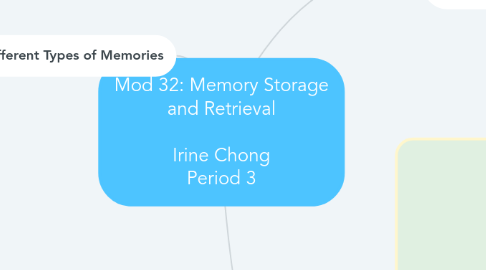
1. Different Types of Memories
1.1. Flashbulb memories
1.1.1. A clear memory of an emotionally significant moment or event. They are emotion-triggered hormonal change memory.
1.2. Long-term Potentiation
1.2.1. A persistent strengthening of synapses based on recent patterns of activity. It is believed to be a neural basis for learning and memory
1.2.1.1. Without it, learning and memories don’t stick. With it, we learn and remember better with practice
1.3. Priming
1.3.1. The activation, often unconsciously, of certain associations, thus influencing one's perception, memory, or response
1.3.1.1. ex) After you see a poster of a missing child, you unconsciously be primed to interpret an ambiguous adult child interaction as a possible kidnapping
1.4. Context Dependent Memories
1.4.1. Putting yourself back in the context where you experienced something can prime your memory retrieval.
1.4.1.1. ex) you can remember words memorized underwater, best underwater.
1.5. State Dependent Memories
1.5.1. Information is best recalled when an individual is in the same physical state as when the information was learned of experienced.
1.5.2. similar to Mood Congruent Memories
1.5.2.1. Our mood state provide an example of memory's state dependence. Emotions that accompany good or bad events become retrieval cues.
1.5.2.1.1. ex) whenever you are in a bad mood, you may remember other bad times.
1.6. Serial Position Effect
1.6.1. The tendency to recall best the last and first items in a list.
2. Processing Information in the Brain
2.1. Explicit Memories: with conscious recall
2.1.1. Frontal Lobes
2.1.1.1. the region of the brain that is used to summon a memory of past experience
2.1.1.1.1. right lobe ex) recalls a visual party scene
2.1.1.1.2. left lobe ex) recalls passwords
2.1.2. Hippocampus
2.1.2.1. brain’s equivalent of a “save” button for explicit memories, but memories aren't stored permanently in hippocampus
2.1.2.1.1. Two parts of hippocampus
2.1.2.1.2. Infantile Amnesia
2.2. Implicit Memories: without conscious recall
2.2.1. Cerebellum
2.2.1.1. Forms and stores the implicit memories created by classical conditioning. Without it, people won’t be able to develop certain conditioned reflexes.
2.2.1.1.1. ex) reaction to dentist's office
2.2.2. Basil Ganglia
2.2.2.1. facilitates formation of our procedural memories for skills.
2.2.2.1.1. ex) learning how to ride a bike
3. Retaining, storing, and getting out information
3.1. Recall
3.1.1. Retrieving information that isn't currently in your conscious awareness but that was learned at an earlier time.
3.1.1.1. ex) during a fill in the blank test.
3.1.2. Retrieval Cues
3.1.2.1. When you encode into memory a target piece of information, such as the name of the person sitting next to you in class, and you associate it with other bits of information (your surroundings, mood, seating position, etc.).
3.1.2.1.1. The more retrieval cues you have, the better your chances of finding a route to the suspended memory
3.2. Recognition
3.2.1. identifying items previously learned
3.2.1.1. ex) a multiple choice question tests your recognition.
3.3. Relearning
3.3.1. learning something more quickly when you learn it a second or later time

